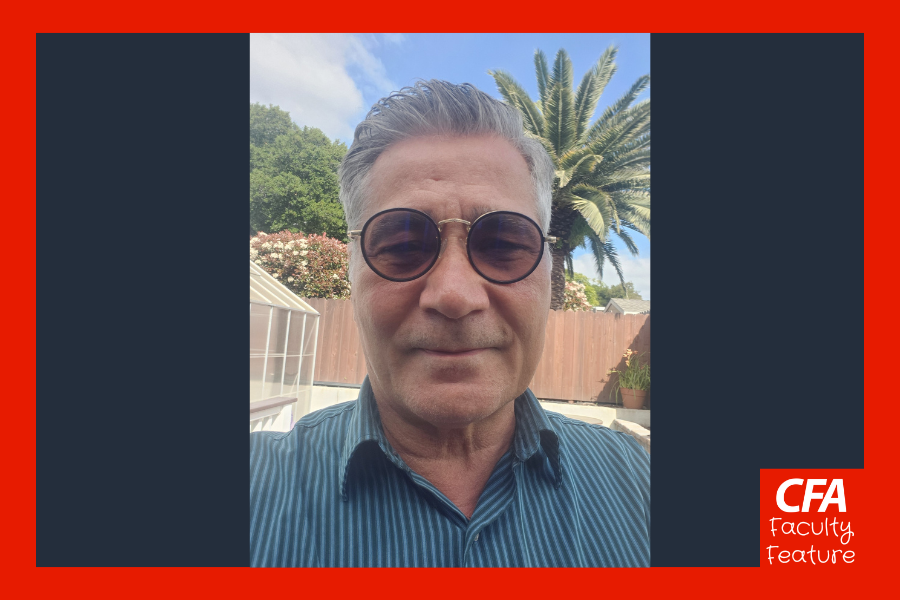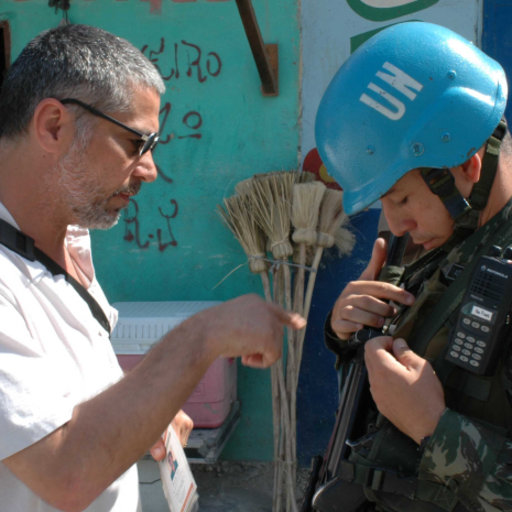Faculty Feature: Shifting the Campus Culture Through a Gaze of Justice
“I’m aware that we’re not in a post-racial United States. Racism and white supremacy are baked into the system. It’s part of the development of capitalism in this country,” said CSU East Bay Lecturer Kevin Pina. “It’s what enticed me to folks at CFA. They are committed to social justice and I feel at home in terms of challenging my own notions of race and racism, diversity and inclusion, but within an encouraging, thoughtful, and educational environment.”

Pina’s previous and ongoing experiences as a human rights reporter, documentary filmmaker, and advocate for democracy have informed him on the importance of union activism and why we must always fight against the injustices we witness.
Having grown up around the corner from the Oakland Induction Center, a young Pina was shaped and inspired by the mass demonstrations of anti-war protestors who engaged in civil disobedience.

His upcoming film,“Occupy Oakland,” calls attention to the Occupy movement that took place in Oakland. “It was a virtual police state in downtown Oakland for a while, and the police were very violent,” said Pina. “A major premise of the film is what made Occupy Oakland different than the rest of the Occupy movement in the U.S. It was no accident that the Oakland police force became one of the most brutal and repressing forces against the Black population.”
As a human rights reporter who has witnessed terrible injustices in Latin America and the Caribbean, Pina’s work centers around fighting bullies and undemocratic behavior.

“I would use my relative privilege with a U.S. passport to leverage myself into situations where I could document human rights atrocities or violations, usually by governments and forces that our own government supported covertly,” said Pina.
Given the often unsafe and precarious nature of human rights reporting, Pina noted, “Teaching is how I come down from all this.”
In his courses, practice – rather than theory – comes first, and it’s an opportunity for him to utilize his work as an activist and a documentary filmmaker.
His student, Michael Francisco, remarked on Pina’s influence on his life. “Professor Pina empowered us to critically examine societal issues through a lens of equity and justice. His approach was not merely academic; it was deeply rooted in the belief that education should serve as a catalyst for positive change in society,” said Francisco, who now works in the engineering department at Tesla. “His teachings instilled within me a sense of responsibility to leverage my skills and knowledge to advocate for marginalized communities and challenge systemic inequalities within the field.”
Having taught over the last 14 years at CSU East Bay, Pina began noticing an established pattern of injustices in his own department that culminated in lecturers being excluded from department meetings.
“I always thought this was unfair,” said Pina. “I was a long-term senior lecturer who had committed so much to my department, and now I won’t be involved in the decisions that directly affect my area of expertise, my students, and my livelihood.”
Pina went to CFA members for help. “I wanted to talk to people who know more about the institutional memory of CSU East Bay and the struggle of lecturer faculty getting recognition at the departmental level.” Through their conversations, Pina was pulled in to serve in various capacities in the union, and he now proudly serves as the CFA Lecturers Representative.
He spoke about how great it felt to be a part of the union long enough to understand the issues involved. “I could actually bring to bear many of my own experiences as a lecturer to the table,” he said. “I’ve learned so much from our members, including tenure-line and lecturer faculty who work together on so many of these issues, not just within the Contract Bargaining Agreement (CBA), but also the day-to-day that we confront in our teaching and in our learning atmosphere that we’re trying to guarantee for our students.”
For Pina, it’s important that lecturers participate in labor actions and also in shared governance. “I think both of these things have to occur,” he said. “In addition to the CBA, we need to understand CSU administration’s policies, and sometimes we have to battle against them, whether that be in Academic Senate, or the Faculty Affairs Committee, or in the subcommittees. These are two parts of faculty involvement that help shape the university to better serve our students.”
However, this is not just faculty’s fight. Pina wants students to recognize that our work is a collaborative effort.
In his Visual Communication and Culture course, Pina had students take images of the recent CFA strike and analyze them through the lens of the theories that had been taught in class. In another instance, he encouraged students to take pictures of the chairs and the environment within Meiklejohn Hall, a campus building that had very old desks that could no longer accommodate many of the students.
“I always encourage them to do their own research and learn for themselves what the reality is,” said Pina. “I want to help them draw the connection between the classroom environment and how we must fight to make it as inclusive as we possibly can.”
“When I look back I’m especially proud of having been part of such a diverse and successful cohort of students. Pina’s classes always really tried to offer everyone a platform for success,” said Raphael Timmons, CSU East Bay alumnus and Media Director for the city of San Francisco.
Former student Dylan Anderman also spoke to Pina’s commitment to his students. “The special thing about Professor Pina is his commitment to anti-racism and social justice. Pina’s classes were very inclusive, and he cared about every student and cared about our progress. Because of his dedication to our education, I landed a job at a news station after college and have only grown since,” said former student Dylan Anderman, who is now a sports reporter at KTVZ in Oregon.
Pina wants to ensure that his students always feel welcome, because the lack of inclusion is something Pina is familiar with. “Lecturers who are hired aren’t even introduced to other faculty or staff,” he said. “Without a support network that would be intrinsic to being able to hit the ground running, and without sharing pedagogy and approaches to learning and teaching, it can be very difficult,” said Pina.
A campus cultural shift must happen. Pina recognizes just how talented and innovative his colleagues are. He believes they can transform both his department and the overall campus. “Yet, the overall tone is set by the campus president, and whatever culture they build internally trickles down and affects the entire visage, the feeling, the culture of a campus,” he said. “It really is about protecting their reputation rather than taking chances to innovate the campus culture.”
“This is why it makes a difference to have a union run by members that are openly dedicated to social justice,” exclaimed Pina. “To be encouraged by CFA members to not only change without but also change within has been very meaningful for me.”
Join California Faculty Association
Join thousands of instructional faculty, librarians, counselors, and coaches to protect academic freedom, faculty rights, safe workplaces, higher education, student learning, and fight for racial and social justice.